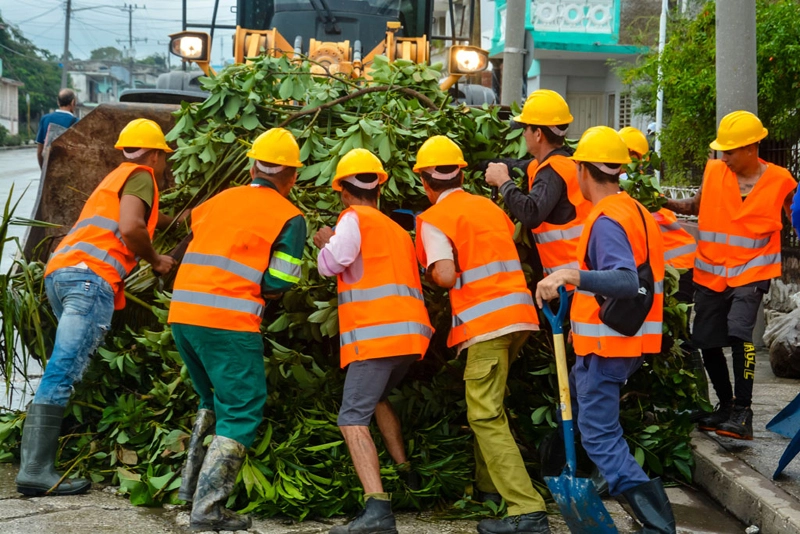Once again, the President of the National Defense Council, Miguel Díaz-Canel Bermúdez, First Secretary of the Communist Party and President of the Republic, reviewed the progress of the recovery efforts in the provinces affected by Hurricane Melissa. During a session of the National Defense Council (CDN) broadcast by the Round Table program from Santiago de Cuba.
The Secretary of the Communist Party of Cuba in the province of Holguin, Joel Queipo Ruiz, reported that the province remains focused on recovering from the damage caused by Hurricane Melissa. Following the priorities established by the Defense Councils at the national, municipal, and provincial levels.
According to Queipo Ruiz, one of the main priorities is providing assistance and engaging with the entire affected population. “Many have lost their belongings, and while they acknowledge the protection they received for what is most sacred—life—and that no one was lost. They do require psychological, cultural, and material support,” the secretary stated. He added that many expressions of affection and gratitude are observed in daily interactions.
During the event, more than 300,000 people were sheltered. Of these, 29,244 were in 99 evacuation centers and more than 247,000 were displaced and housed. The official explained that, although flooding has subsided, rains from a cold front in the last 72 hours forced the evacuation and sheltering of people in the municipalities of Sagua, Cacocum, and Jibaro.
In addition to those in Rafael Freyre, Antilla, and Urbano Noris. In total, residents of seven municipalities have been evacuated and sheltered. Currently, 298 people remain in five evacuation centers. More than 1,010 are sheltering in other homes, which, according to Queipo Ruiz, “demonstrates the solidarity of our people.”
The Holguin Party Secretary provided a detailed report on basic services. In the water sector, 13 water trucks and 131 pumping stations have been repaired, restoring 83.8% of the piped water service to the affected population. He mentioned that three municipalities are now receiving more water than before the hurricane, due to the preceding drought. “For example, in the case of the company that supplies 50 percent of the city, we have water that will flow by gravity to the pumps for 14 months. This is something that gives us security,” he assured.
Regarding the electrical system, 188 of the 204 affected circuits have been restored, meaning that 86.2% of customers now have service. However, 52,100 customers are still without power in the hardest-hit municipalities of Mayari, Urbano, Frank, and Baguanos. Thirty transformers have been reported damaged, and repairs are underway with national support. Three photovoltaic parks are now operational.
In telecommunications, progress has been rapid: 196 of the 342 damaged telephone poles have been repaired, and 35,806 customers (89 percent of those affected) now have service. 187 mobile phone base stations and the 33 damaged fiber optic cables have also been restored. Queipo Ruiz expressed his gratitude for the support provided by contingents from Matanzas, Holguin, Mayabeque, and Havana City.
In the education sector, 121 of the 683 affected institutions have been repaired. Of the province’s 1,323 institutions, 1,269 are now operational, with 54 remaining closed, although alternative methods are being used. One of the most significant impacts was the loss or damage of more than 8,370 mattresses. In response, a production line has been opened at the Jibaro factory, and donations have been received. Additionally, repair workshops in Holguin, using materials provided by the community, are restoring many of these mattresses.
Regarding housing, 20,200 requests have been received, and 58 homes have been repaired. A number expected to increase with the arrival of zinc and fiber cement roofing sheets. The official report tallies 926 total collapses, 1,215 total roof damages, 2,735 partial collapses, and 14,446 roof damages.
In healthcare, of the 191 affected institutions, 54 have been repaired. Currently, 1,264 of the 1,268 healthcare facilities are operational. Only four in Baguanos remain closed due to access problems. The secretary highlighted that “complex health interventions” are being carried out in municipalities such as Holguin, Cacocum, Urbano Noris, and Cueto, due to the challenging sanitary conditions following the floods.
In the agri-food sector, 35,000 hectares were affected, but 910 hectares and 2,384 organic garden plots. Vital due to their short growing cycle, have already been recovered. Thirteen bakeries and 57 bodegas (small grocery stores) have also been reopened. The subsidized basic food basket is being distributed, and more than 500 production units have been mobilized in the province.
One element being intentionally addressed is the fight against price gouging. According to Queipo Ruiz, more than 4,700 seizures have been made for forced sales to people who “have not grasped the magnitude of the situation we are experiencing.” As of June 22, more than 4,000 people have benefited from these actions. He acknowledged that many state and private entities have maintained or even lowered their prices, demonstrating solidarity.
Finally, Joel Queipo Ruiz wanted to “highlight the solidarity of the other provinces in the country, international solidarity, and the solidarity of the people of Holguin.” He emphasized that there is coordination among all working groups and that the objective remains to “leave the city more beautiful than before the hurricane and make the land more productive.” The province, he concluded, intends to achieve this “with honor, dignity, and patriotism.”
With information from cubadebate.cu/Editorial Staff
- Medical Equipment in Holguin Guaranteed to Be in Operation - 12 de February de 2026
- Aid Arrives in Cuba from Mexico - 12 de February de 2026
- Tauba Holmotor in Holguin Expands Production Through Innovation - 12 de February de 2026

